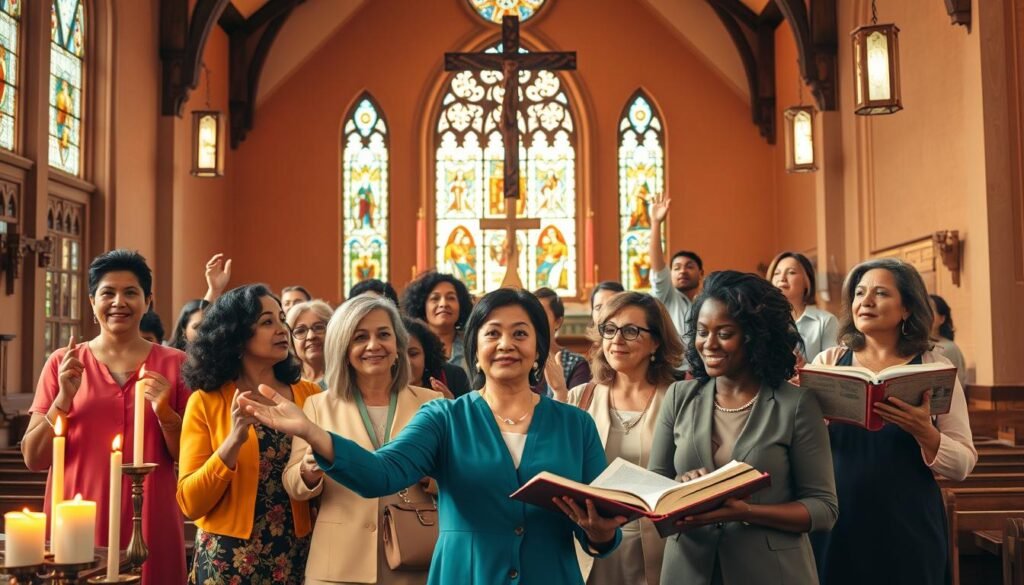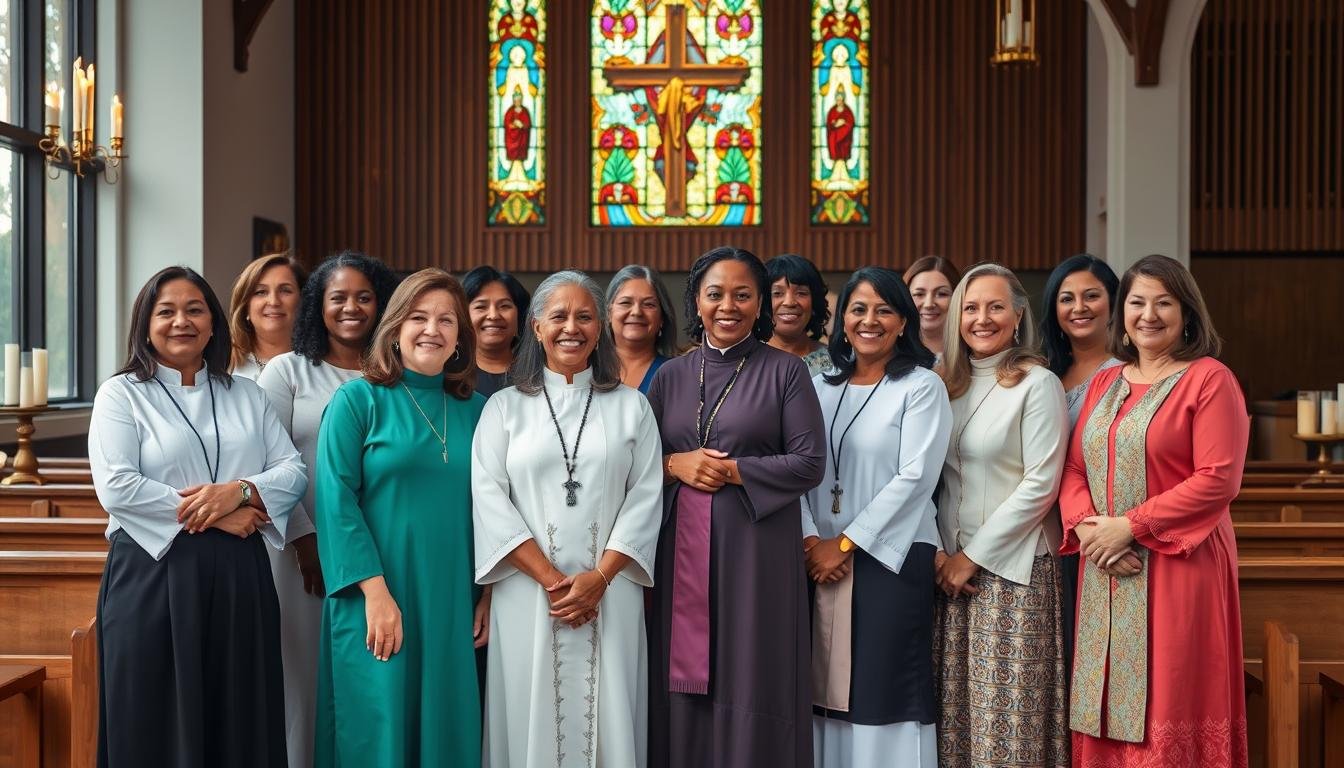Can the old belief that only men should be pastors be challenged? This question sparks a big debate in many Christian groups. It’s about whether women can lead in churches.
About 40% of Christians think women shouldn’t be pastors. But, studies show different views based on who you are. More women than men think women should be pastors.
We will look at the roles women have had in the Bible and today’s churches. We’ll see what this debate means and why it matters.
The Biblical Foundation for Women in Leadership
The Bible shows many views on women leading in Christianity. Some passages, like 1 Timothy 2:11-12, make us wonder about female church leaders. But, the Bible also shows women playing key roles in both the Old and New Testaments.
Women like Deborah, Huldah, and Priscilla led despite tough cultural rules. Scholars like Andreas Kostenberger and Thomas Schreiner talk a lot about these Bible stories. They say that understanding women as pastors depends on the time period and education of women back then.
Some verses, like 1 Timothy 3:1-3 and Galatians 3:28, support women in ministry. The New Testament also talks about strong female leaders like Phoebe and Junia. Acts 2 says the Holy Spirit’s gifts are for everyone, no matter their gender.
This view of equality in the spirit suggests women can lead in their own way. Scholars say male leadership doesn’t stop women from helping. Looking closer at the Bible, the debate on women pastors keeps growing. It shows how old traditions meet new ideas.
The Key Verse: Understanding 1 Timothy 2:12
1 Timothy 2:12 says, “I do not permit a woman to teach or to exercise authority over a man; rather, she is to remain quiet.” This verse is key in talks about gender roles in church. It makes people wonder about women’s roles in church leadership.
To understand 1 Timothy, we must look at the church’s culture and history. Scholars say this verse might not fit all churches today. They think we should look closely at why Paul wrote it.
Even with these debates, women are still important in church. Women can’t be pastors or leaders, but they can still help in many ways. This shows men and women can work together to help the church.
Talking about 1 Timothy 2:12 brings up big questions about women in ministry. Looking back, this verse has shaped how people see women’s roles in church. Even though people interpret it differently, it’s very important in church discussions.
Contextual Interpretation of Scripture
To understand women’s roles in leadership in Christianity, we must look at the early church’s history, especially in Ephesus. The Ephesus culture of the first century often kept women down. Paul’s teachings were a response to these issues, not a rule against women leading.
The temple of Artemis in Ephesus was important. It gave women power in religious life. Paul wanted to make sure Christian practices were different from those in Ephesus.
The Historical and Cultural Context of Ephesus
In Ephesus, gender roles and religious power were mixed. Women could join in some rituals but not others. This mix influenced Paul’s letters in the Pauline epistles.
He wanted to create orderly worship and clear teachings. He also challenged cultural practices that didn’t fit his vision. So, his rules on women were shaped by Ephesus’s culture, not a universal rule.
Paul’s Instructions in Broader Context
Looking at Paul’s teachings on women, we see a bigger picture. While he gave some rules that seemed to limit women, he also valued their contributions. Women like Priscilla and Phoebe played big roles in the church, as Paul’s letters show.
This shows Paul’s teachings were not just strict rules. They were meant to address specific problems while recognizing women’s ongoing roles in the church.

How God has Used Women Throughout History
Women have played big roles in leading throughout the Bible. Deborah and Huldah are great examples. They showed that women can lead and make big changes.
The Examples of Deborah and Huldah
Deborah was a leader in the Old Testament. She was a prophetess and judge for Israel. She even led Israel to victory against the Canaanites.
Deborah’s story shows that women can lead with respect. Huldah also played a key role, guiding King Josiah. These stories prove women can teach and lead in the church.
Women in Leadership Positions
Women have made big impacts in church history too. Phoebe and Priscilla were important in the early church. They taught and shared the gospel with men.
Galatians 3:28 says there’s no difference between men and women in Christ. This shows God wants equality. Even when women were pushed aside, they still made a difference.
Looking at these examples, it’s clear women have always been meant to lead. Some might say 1 Timothy 2:12 limits women’s roles. But Deborah and Huldah’s stories show God uses women in big ways. For more on women’s roles in the church, check out this resource.
New Testament Perspectives on Women in Ministry
The New Testament shows us how important women were in early Christianity. Mary Magdalene is a key example. She shows us how women helped Jesus spread his teachings.
Her role challenges the limits put on women in churches today.
Mary Magdalene as the First Witness to the Resurrection
Mary Magdalene was the first to see Jesus after he rose from the dead. This event was more than a personal moment. It showed Jesus’ new way of leading and his trust in women leaders.
By picking a woman to share the news, Jesus broke old rules. This act shows women were key in spreading the word of Jesus.
Women in Paul’s Missionary Work
Paul wrote about many women in his letters, showing their big role in growing the church. Women like Phoebe, Prisca, and Junia were leaders in sharing the Christian message.
Paul called Phoebe a deaconess, showing women could lead in the church. He also praised women like Tryphaena and Tryphosa. This shows women worked together with men in ministry.
Challenges to the Complementarian View
Complementarianism says men and women have different roles in church. It believes men should lead. But, many argue this view ignores women’s leadership roles in the Bible.
The word “pastor” or “shepherd” is used a lot in the New Testament. It shows these roles are key in church leadership. In Acts 20:28 and 1 Peter 5:2, elders are called to shepherd. Ephesians 4:11 says Christ gave “shepherds” to the church, showing both men and women are important.
Even with these examples, the Baptist Faith and Message (2000) says only men can be pastors. This shows complementarian views still shape many churches. The fear of losing gender roles in church leadership keeps some from accepting women pastors.
Many churches stick to the complementarian view. This creates a big divide in Christian discussions. More articles support complementarianism than biblical feminism. But, more people, especially the young, are starting to think differently about women pastors.

Can Women Be Pastors In Christianity?
The debate about women as pastors is very lively in Christian groups. People say that old ways of reading the Bible might not be right for everyone. They think that women should be able to lead in church because it’s fair.
Arguments Against Restrictions on Women Pastors
Many experts and theologians think women should be pastors. They point out that the New Testament shows Jesus included women. This shows that women can lead in church.
They also say that old rules for women in church were too strict. This makes them want to look at the Bible in a new way. They want to see equality for everyone, not just men.
The Role of Cultural Relevance in Biblical Interpretation
Understanding the Bible today means looking at its cultural background. We need to see how the Apostle Paul’s words apply now. Scholars say we should rethink old ideas that kept women out of leadership.
They believe we should look at the Bible in a way that fits today’s world. This means seeing women as leaders in church. It’s about fairness and following Jesus’ teachings.
Contemporary Debates on Women Pastors
The talk about women pastors is changing. It’s about what the Bible says and women’s roles in church. Many views have come up, especially after big events and books that question old ideas.
Philip Payne wrote “The Bible vs. Biblical Womanhood.” He says equality is not just about the Bible. He thinks it’s also about social change. This idea is popular among those who want women in leadership, sparking talks in many churches.
Big talks happened at TGC21, with people like Kevin DeYoung and Nancy Guthrie. They talked about what it means to be a leader in church. The Southern Baptist Convention (SBC) is also in the middle of this, with Rick Warren trying to make things more equal. But, there’s a lot of disagreement about women’s roles.
People look at texts like 1 Timothy 2:12 a lot. Some say women can’t teach or lead men in church. But, John Dickson says preaching today is different from what the Bible talks about. He thinks women can preach, and many respected scholars agree with him.
These debates show different views on church leadership and gender roles. They also show how society is changing. The talks about women pastors are about finding a balance between the Bible and today’s ideas of equality.
The Impact of Denominational Differences
Denominational views greatly affect opinions on women in church leadership. Some Christian groups fully support women in ordained roles. They believe in equal opportunities for everyone.
On the other hand, some groups stick to old views, limiting roles by gender. A survey shows 55% of Protestant pastors think women can be senior pastors. This number is higher in mainline groups, where 76% of pastors agree, compared to 44% in evangelical groups.
Views also vary in other leadership roles. Most pastors agree women can work with kids and teens. But, only 64% think women can be deacons. This shows the complex issues in church leadership and women’s roles.
79% of mainline pastors and 56% of evangelical ones think women can be deacons. This shows different views in different traditions.
Age also plays a role. Older pastors are more open to women as senior pastors. Younger ones are less likely. African American pastors are more open to women leading, especially with teens and adults in Bible studies.
The role of women in church leadership is shaped by different views. Progressive groups often support women’s roles. This shows a big change towards being more inclusive in church leadership.
Looking Ahead: The Future of Women in Pastoral Roles
The future of women pastors in Christianity is changing. Society is becoming more open, and churches are welcoming new ideas. This change is thanks to progressive trends in church leadership.
Women are now stepping into roles they were once barred from. This shift is huge, from the strict views of the 1960s to today’s acceptance. Women in pastoral roles are bringing new leadership styles that highlight their importance in ministry.
Women still face challenges, especially in old-fashioned churches. But, studies show talking about women in ministry softens opinions. This shows that female clergy are just as good as male ones.
Yet, some places still hold onto old views. They worry about losing members or money. This shows the tough journey women face in these areas.
The future looks bright for women in ministry. We need to create places where they are valued and can grow. With a focus on inclusion, the church can grow together, led by diverse leaders.
FAQ
What are the main biblical arguments for women serving as pastors?
The Bible shows women like Deborah and Huldah leading in church. Phoebe and Priscilla also played big roles. It teaches equality in Christ, supporting women in ministry.
How does 1 Timothy 2:12 impact the discussion on women pastors?
1 Timothy 2:12 seems to limit women teaching men. But, scholars say it’s about Ephesus, not all women. It’s not a rule against women pastors everywhere.
What is the complementarian perspective on women in church leadership?
Complementarians believe men and women have different roles in church. They think men should lead. Critics say this ignores women leaders in the Bible.
What are some historical examples of women in church leadership?
Women like Mary Magdalene were key in early Christianity. Paul mentions women like Euodia and Syntyche in his letters. These stories show women’s important roles in church history.
How do contemporary debates shape the role of women in ministry today?
Today, debates focus on equality and scripture. They affect church rules and who can lead. Some support women leaders, while others stick to old views.
What is the significance of cultural context in interpreting scripture about women pastors?
Knowing the culture of the Bible is key. Scholars say some rules were for then, not now. This means we should rethink old views.
What are the future prospects for women in pastoral roles within Christianity?
Women’s chances to lead in church look good. More groups are welcoming female leaders. As views on equality change, new ways of leading are being tried.

Rockin’ the faith, one verse at a time!
Growing up, the Bible’s stories deeply impacted me. Now, with over 15 years of preaching experience, I blend timeless teachings with modern technology, making them relevant for today’s world.
Bible Hub Verse is my platform to share historical insights and thought-provoking articles, exploring both familiar and uncommon Christian topics. My passion is building a welcoming online space for everyone to learn, grow in their faith, and discover the Bible’s enduring message.
Join the journey!
God bless you.






